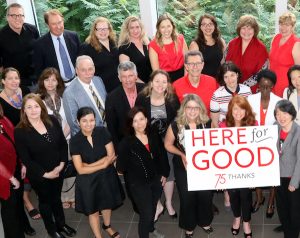 By Ryan Davies.
By Ryan Davies.
Many charities have incorporated one-off crowdfunding campaigns into their philanthropic strategies. Carleton University has adopted a more ambitious perspective with this technique. Rather than hosting one-off campaigns on third-party platforms, the university empowers students and faculty to lead their own fundraising on a dedicated platform. Today, the FutureFunder, one of the first crowdfunding platforms for higher education in North America, has vastly expanded Carleton’s digital fundraising potential, and is a major component of a culture of philanthropy on campus.
This strategy was developed in 2012, during the quiet phase of Carleton’s $300 million Collaborate Campaign. At the time, the university’s fundraising outreach was centred on unrestricted giving, endowed funds and academic or capital projects, which were attractive to major gift donors but often out of reach for other donors. This overlooked an important need—funding for grassroots student projects. Across campus, students were hosting bake sales and events to raise money for academic competitions, varsity and club sports, capstone research projects, and other learning initiatives. But their reach was limited, as donors who were physically outside of the campus couldn’t participate.
Students were ahead of the problem
Some students were already leading crowdfunding campaigns on emerging external platforms like IndieGogo and Kickstarter. Carleton helped students by creating a dedicated crowdfunding platform, so that more students could easily crowdfund. The Advancement Department would take care of all administrative requirements (such as hosting and processing donations) and let the students focus solely on the creative aspects.
There would also be larger campaign benefits. The modest funding goals of these projects would be very attractive to Carleton’s traditional donor base. And students would effectively become volunteer fundraisers, extending the university’s overall outreach.
 Everyone on campus is a fundraiser
Everyone on campus is a fundraiser
Started in mid 2012, the FutureFunder has a typical crowdfunding user interface, complete with countdown clocks, progress meters and shareable content. Donors make a gift and see an immediate change on the progress meter. At the end of the transaction, they receive an electronic gift receipt and a thank-you from Carleton. To submit a project, students complete an online form, describing their idea and need and identifying fundraising goals and timelines.
Carleton’s Advancement Office boosts these efforts through university social media channels. Before posting, Advancement staff assess each project to ensure its charitability and help manage expectations. There are no fees to use the FutureFunder.
The appeal extends beyond the student body
Today, faculty are turning to the FutureFunder to support small research projects. Advancement works with deans and directors to host departmental fundraising initiatives online; staff and faculty champion these projects in their personal social media, turning everyone on campus into fundraisers.
Each year, close to 100 campaigns are posted, with a particular push around GivingTuesday (in late November or early December), when online donations are eligible for matching funds. The projects have brought new donors to Carleton, and online giving is up significantly: online revenue from the FutureFunder is well over $1 million a year.
Most importantly, the entire campus understands the potential and excitement of philanthropy; it has become personally meaningful to many. Today, Carleton can depend on the volunteerism, enthusiasm and reach of its campus community in its fundraising efforts—an incredible addition to campaign success and sustained growth of a philanthropic culture.
Ryan Davies is the Director of Digital Transformation in Advancement Communications at Carleton University. He’s on LinkedIn.
Friday, February 5, 2021 in Fundraising
Share: Twitter, Facebook



